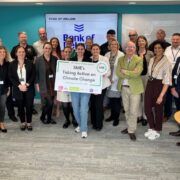The CEO of Fuels for Ireland Kevin McPartlan shares his life and business lessons.
Kevin McPartlan has led Fuels for Ireland (FFI) through its transition from the Irish Petroleum Industry Association after joining in 2018. His leadership reflects a strong commitment to achieving carbon neutrality by 2050, a crucial goal for Ireland’s energy future.
With a background in law and extensive experience in communications and public affairs, McPartlan has worked with NGOs, start-ups, multinationals, and political bodies. He was educated at University College Cork and the Honorable Society of Kings Inns, and has previously led industry associations in the food sector.
“As the voice of the Irish fuels industry, there is often an assumption that we are climate-change deniers. One of our great challenges is to establish that we too share the objective of achieving carbon neutrality by 2050”
McPartlan believes that while electric vehicles (EVs) are important, relying solely on them may hinder Ireland’s progress towards its carbon targets. He highlights the benefits of Liquified Fossil Fuels like Hydrotreated Vegetable Oil, which have shown significant carbon emission reductions. He advocates for a comprehensive review of fiscal policies and greater support for environmentally friendly alternatives to ensure these solutions are economically viable for consumers.
He also emphasises the need for robust certification processes to prevent fuel fraud and ensure the sustainability of biofuels, a stance he has championed in dialogues with both the Irish Government and the EU Commission.
Tell us about your background, what journey did you take to arrive at where you are?
I began my career in public relations, gaining valuable experience both in-house and with agencies across the UK and Ireland. At 28, I decided to further my education by studying law at UCC and Kings Inns. After completing my studies, I transitioned to public affairs in Dublin.
My career then took an international turn, where I spent several years advising governments on managing their global reputations and maximizing their international influence. Upon returning to Ireland, I joined Ibec, where I led industry associations in the food and drink sector. Six years ago, I was thrilled to be appointed the first CEO of the (then) Irish Petroleum Industry Association, embracing the challenge and opportunity of this leadership role.
As the head of Fuels for Ireland (FFI), I represent the forecourt operators and fuel providers of Ireland.
“I aim to bridge the gap between industry and policy, ensuring that practical, technology-neutral solutions are part of the conversation on achieving net-zero emissions by 2050”
Why are you doing what you are doing? What’s your USP?
Lobbying plays a crucial role in our democratic process. The voices of industry, alongside other stakeholders, are essential for fostering informed debate and creating sound legislation.
As part of my role, I aim to bridge the gap between industry and policy, ensuring that practical, technology-neutral solutions are part of the conversation on achieving net-zero emissions by 2050.
What are your key skills and qualities that set you apart?
I’m well-practiced at transforming complex, often dry policy into clear and tangible points: I’m good at storytelling.
My legal training taught me how to present facts, interpretations, and opinions in a narrative that is comprehensible, relatable, and credible. This is the most persuasive form of advocacy.
I also play with a straight bat at all times. In my position, credibility is everything so I ensure that those with whom I deal know that, even if we disagree, I will never mislead them.
What’s the most challenging aspect of your role?
As the voice of the Irish fuels industry, there is often an assumption that we are climate-change deniers. One of our great challenges is to establish that we too share the objective of achieving carbon neutrality by 2050, and that we can have a genuine significant positive impact in achieving this.
FFI members currently provide 50% of Ireland’s total energy needs, and we are actively working on integrating biofuels and other renewable energy sources to reduce emissions. By advocating for a technology-neutral approach, we aim to ensure that all viable options for reducing emissions are considered and implemented.
“To me, the only real failure is to fail to learn from experiences”
What (or whom) has helped you most in your career along the way? Who was your greatest mentor/inspiration?
My first “proper” job was with Royal Mail in Newcastle upon Tyne. The Divisional Head Postmaster was a tough Geordie called Neville Rutherford who had come up through the ranks from telegraph boy over 40 years with the company. He gave me the foundations of my approach to work and rarely will a day go by when I don’t think of some of the advice he gave me.
But learning should never end and one of the great things about running industry associations is working closely with the leaders of member companies.
I have had the privilege of working closely with exceptional business people. Whether the head of a multinational PLC’s Irish operation, or the founder or owner of a great homegrown business, I have learned a lot from them all, and continue to do so.
What was the greatest piece of business advice you ever received?
My pal Stephen O’Leary (founder of Olytico) threw out a line in casual conversation many years ago that has become something of a mantra for me: “The main thing is to keep the main thing the main thing.”
It is a great reminder to resist distraction and focus on the end-goal.
What circumstances/qualities/events can mark the difference between success or failure in life or business?
To me, the only real failure is to fail to learn from experiences.
That said, I am a huge believer in setting clear long-term strategic objectives, and SMART criteria for milestones. As one reviews each day, month, campaign, project, or initiative the key question is whether it has brought us closer to or further from the long-term target. This is the same in life or business.
External factors are largely irrelevant. If a circumstance, quality, or event is impacting on the achievement of the objective, one must adapt.
“The role which social media is playing in policy debate is ever evolving – in my view not for the better”
How has digital transformation been a factor in your work?
My work is largely dependent on building and maintaining relationships. While digital technologies have transformed the means of communication, they cannot replace the respect and trust one builds up with Members, regulators, public representatives, the media and one’s own team.
Additionally, the ability of FFI members to process and analyse data quickly due to advancements in technology supports our planning decisions and strengthens our lobbying efforts, enabling us to present well-informed and data-driven arguments.
What are your thoughts on where technology overall is heading and how it will apply to business generally and your business particularly?
Like everyone in business, I am alert to the possibilities and challenges which AI will present. Already, I believe it can be useful in research tasks but industry associations should be adding to debate on topics of importance to its sector rather than regurgitating materials which already exist on those subjects. I don’t yet believe it is very useful for my work, but have no doubt it soon will have an impact.
More broadly, the role which social media is playing in policy debate is ever evolving – in my view not for the better. It is impossible to present considered, nuanced arguments in 280 characters – or in a highly polarised environment. I sincerely hope we develop a more mature understanding of how informed public debates can be facilitated and policies formed.
What technologies/tools do you use personally to keep you on track?
I’m not a great techie, but I have been converted to a digital notepad. I used to go through dozens of hardback A5 books every year, but my Supernote will probably manage to store all the notes I will make until I retire! It’s great to be able to search back by dates or tags and immediately bring them up to jog my memory.
And, like most people, I would be really lost without my phone. I probably spend more than 50% of my working life away from my desk so that is the tool I use to manage my diary, keep on top of my mails, monitor what is going on in Leinster House, read the news that impacts on my sector and, naturally, keep in touch with Members, colleagues and stakeholders.
Who inspires you in business today?
I had the great privilege of meeting Ursula Burns a few years ago.
She was the first black woman to be CEO of a Fortune 500 company and is now the chair of Teneo, as well as a non-executive director of companies like Uber, ExxonMobil and American Express.
It wasn’t what she said, but rather the attitude she brought to a conversation about leading people and organisations. Her book “Where You Are Is Not Who You Are” is fabulous.
What social media platforms do you prefer and why?
I’ve learned quite a lot through LinkedIn – and been involved in some genuinely interesting and enlightening conversations. It’s a good way to maintain professional relationships – particularly for someone like me who has worked in a number of different countries.
It’s also like to keep an eye on what other industry associations are doing at home and abroad and through LinkedIn, Instagram, Facebook and X it is possible to quickly judge the efficacy and impact of their various campaigns and projects.
What business books do you read or would recommend?
I honestly do not read too many business books. I prefer sports biographies and current affairs and find I gain more insight into leadership from those.
I do, however, subscribe to Harvard Business Review and often find articles which give me food for thought and reflection.
Finally, if you had advice for your 21-year-old self – knowing what you know now – what would it be?
Take your work seriously, but not yourself.
-
Bank of Ireland is welcoming new customers every day – funding investments, working capital and expansions across multiple sectors. To learn more, click here






